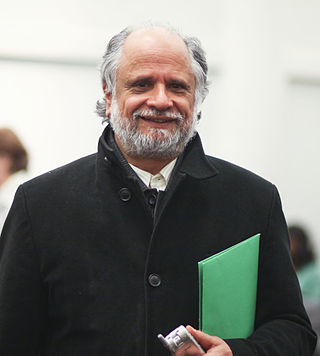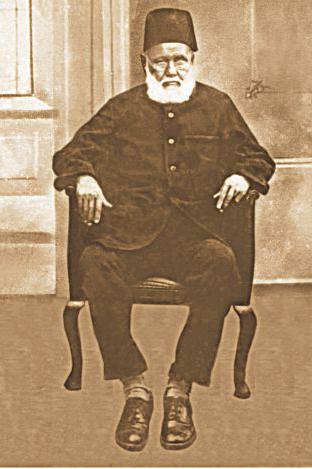Related Research Articles

Otto Weininger was an Austrian philosopher who lived in the Austro-Hungarian Empire. In 1903, he published the book Geschlecht und Charakter, which gained popularity after his suicide at the age of 23. Parts of his work were adapted for use by the Nazi regime. Weininger had a strong influence on Ludwig Wittgenstein, August Strindberg, and, via his lesser-known work Über die letzten Dinge, on James Joyce.

Homi Kharshedji Bhabha is an Indian scholar and critical theorist. He is the Anne F. Rothenberg Professor of the Humanities at Harvard University. He is one of the most important figures in contemporary postcolonial studies, and has developed a number of the field's neologisms and key concepts, such as hybridity, mimicry, difference, and ambivalence. Such terms describe ways in which colonised people have resisted the power of the coloniser, according to Bhabha's theory. In 2012, he received the Padma Bhushan award in the field of literature and education from the Indian government. He is married to attorney and Harvard lecturer Jacqueline Bhabha, and they have three children.

Serge Abrahamovitch Voronoff was a French surgeon of Russian origin who gained fame for his practice of xenotransplantation of monkey testicle tissues onto the testicles of men for purportedly as anti-aging therapy while working in France in the 1920s and 1930s.

Other is a term used to define another person or people as separate from oneself. In phenomenology, the terms the Other and the Constitutive Other distinguish other people from the Self, as a cumulative, constituting factor in the self-image of a person; as acknowledgement of being real; hence, the Other is dissimilar to and the opposite of the Self, of Us, and of the Same. The Constitutive Other is the relation between the personality and the person (body) of a human being; the relation of essential and superficial characteristics of personal identity that corresponds to the relationship between opposite, but correlative, characteristics of the Self, because the difference is inner-difference, within the Self.
India has developed its discourse on sexuality differently based on its distinct regions with their own unique cultures. According to R.P. Bhatia, a New Delhi psychoanalyst and psychotherapist, middle-class India's "very strong repressive attitude" has made it impossible for many married couples to function well sexually, or even to function at all.

Khan Bahadur Qazi Azizul Haque was a Bengali inventor and police officer in British India, notable for his work with Edward Henry and Hem Chandra Bose in developing the Henry Classification System of fingerprints, which is still in use. Haque provided the mathematical basis for the system.

Eugen Steinach was an Austrian physiologist and pioneer in endocrinology. Steinach played a significant role in discovering the relationship between sex hormones and human physical identifiers.

Sir William James Herschel, 2nd Baronet was a British ICS officer in India who used fingerprints for identification on contracts.
Barun De was an Indian historian. He served as the first professor of social and economic history of the Indian Institute of Management, Calcutta, founder-director of the Centre for Studies in Social Sciences, Calcutta and the Maulana Abul Kalam Azad Institute of Asian Studies, Kolkata and as the honorary state editor for the West Bengal District Gazetteers. He was chairman of the West Bengal Heritage Commission.
Joanna Bourke, is a British historian and academic. She is professor of history at Birkbeck, University of London.
Postcolonialism is the critical academic study of the cultural, political and economic legacy of colonialism and imperialism, focusing on the impact of human control and exploitation of colonized people and their lands. The field started to emerge in the 1960s, as scholars from previously colonized countries began publishing on the lingering effects of colonialism, developing a critical theory analysis of the history, culture, literature, and discourse of imperial power.

The Bloodless Revolution: Radical Vegetarianism and the Discovery of India is a 2006 non-fiction book by English author Tristram Stuart. It was published in the United States as The Bloodless Revolution: A Cultural History of Vegetarianism From 1600 to Modern Times.

Vinay Lal is an Indian historian. He is a professor of history and Asian American studies at UCLA. He writes widely on the history and culture of colonial and modern India, popular and public culture in India, cinema, historiography, the politics of world history, the Indian diaspora, global politics, contemporary American politics, the life and thought of Mohandas Gandhi, Hinduism, and the politics of knowledge systems.

Maheshwari, also spelled Maheshvari, is a Hindu caste of India, originally from what is now the state of Rajasthan. Their traditional occupation is that of commerce and as such they form part of the wider Bania occupation-based community that also includes castes such as the Khandelwals, Oswals and Agrawals, Gahois.
Frank Trentmann is a professor of history in the Department of History, Classics and Archaeology at Birkbeck College, University of London. He is a specialist in the history of consumption.

Churchill's Secret War: The British Empire and the Ravaging of India during World War II is a book by Madhusree Mukerjee about the Bengal famine of 1943 during the period of British rule in India. It was published in August 2010 by Basic Books of New York, and later that month by Tranquebar Press of Chennai. The book examines the role in the famine, and subsequent partition of India in 1947, of Prime Minister Winston Churchill.
Madhusree Mukerjee is an Indian-American physicist, writer, editor, and journalist. She is the author of The Land of Naked People: Encounters with Stone Age Islanders (2003) and Churchill's Secret War: The British Empire and the Ravaging of India during World War II (2010). She is a contributor to the People's Archive of Rural India and a senior editor with Scientific American.

Padma Anagol is a historian known for her work on women's agency and subjectivities in colonial India. Her work broadly focuses on gender and women's history in colonial British India. Her research interests also include a wide spectrum of topics such as material culture, consumption and Indian middle classes, theory, historiography and periodization of Modern India and comparative histories of Victorian and Indian patriarchies over the issues of social legislation.
Joseph S. Alter is an American medical anthropologist known for his research into the modern practice of yoga as exercise, his 2004 book Yoga in Modern India, and the physical and medical culture of South Asia.
Tirthankar Roy is an Indian economic historian and Professor of Economic History at the London School of Economics. He is a researcher of the Economic History of South Asia and India, having published over 25 books and numerous articles. His work spans the fields of Economic History, Business History and Social History, particularly studying the effects of British colonialism in India on its economic development.
References
- ↑ "Prof Chandak Sengoopta — Birkbeck, University of London". www.bbk.ac.uk. Retrieved 7 October 2021.